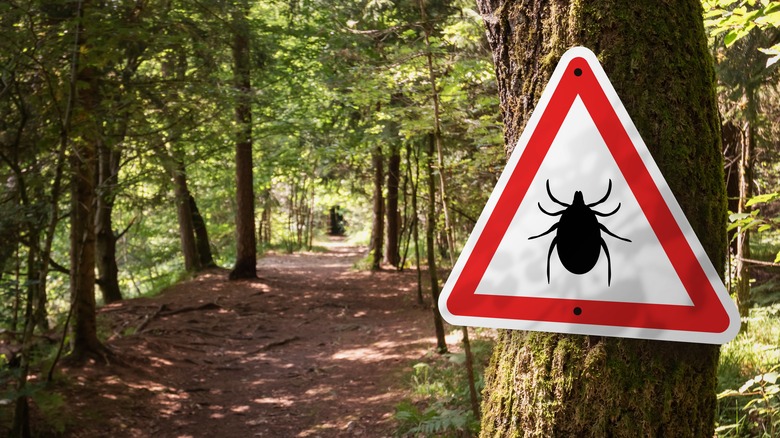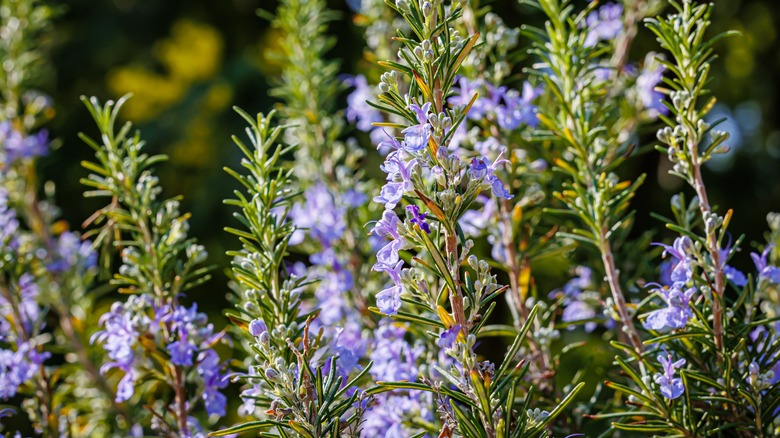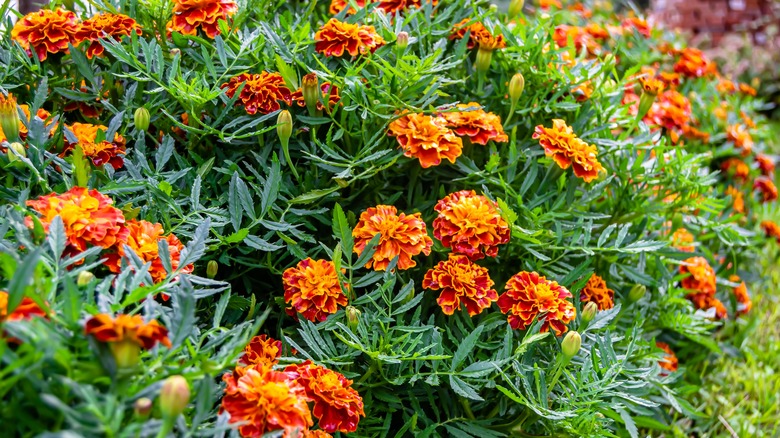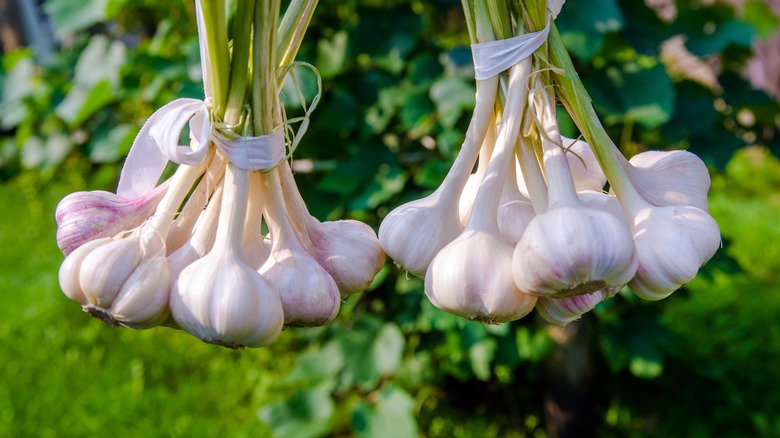5 Ways To Make Your Home Garden Repel Ticks And Fleas
When the weather warms up, nothing is better than enjoying some sunshine in the garden. The only problem with the weather getting warm is that it causes the resurgence of some of the most annoying bloodsuckers around. While you can wear chemical repellents to keep ticks and fleas off of your body, wouldn't it just be easier to keep them out of your yard? Luckily, it is possible to keep fleas and ticks out of your yard by using a bit of thoughtful landscaping, including adding certain varieties of plants to your garden.
This method works because certain plants are capable of repelling ticks and fleas (or the animals that carry them like mice and deer) with their scent. However, while some plants can help repel biting insects, this method won't keep the fleas and ticks away if your yard is attractive to them in other ways. So, before you start lining the boundary of your garden with tick-repelling rosemary or wormwood, make sure that you are already maintaining your yard and keeping it tick-habitat-free.
To do this, stay on top of cleaning up dead leaves, brush, or other debris. Also, make sure to regularly mow (tall grass is a tick's best friend), keep your woodpile up off the ground, and use animal-proof trash bins. Once you've done all this, you are ready to start adding some of the following plants to your garden to kick out those pesky bloodsuckers once and for all.
Plant strong-scented herbs
If you love cooking with fresh herbs, then this is probably the best option for you because there are plenty of fragrant herbs that smell and taste beautiful to humans but can repel many insects including ticks and fleas.
The most commonly cited examples are rosemary and wormwood. Rosemary essential oil has been proven to disrupt tick reproduction. While the smell of the essential oil is stronger than that of the plant, the same principle applies and ticks will dislike the fresh herb. The scent of rosemary also repels deer which can carry the ticks that cause Lyme disease. Wormwood is also capable of repelling ticks, fleas, deer, and mice through its strong scent and bitter taste. Other herbs that help keep ticks and fleas out of your garden include lemongrass, lavender, and mint.
For this method to work, you will need to create barriers around your yard and garden using these herbs to prevent the fleas, ticks, and the animals that carry them from wanting to enter.
Add some beautiful flowers that double as insecticides
If you don't have a vegetable or herb garden, then don't worry — you don't have to plant a bunch of rosemary around your flowers. Instead, you can go for common ornamental flowers that contain pyrethrum which is a proven natural insecticide. This naturally occurring chemical has been used to ward off bloodsuckers for centuries and, even today is a common ingredient in mosquito coils. In fact, many modern pesticides meant to repel ticks are actually modeled after this naturally occurring compound.
And what plants contain pyrethrum? As it turns out, this chemical is released by a few common flowers including chrysanthemums and marigolds. Although a little harder to find, the flower with the most pyrethrum is a special type of chrysanthemum commonly known as a pyrethrum daisy. So, to protect your peace while relaxing in your flower garden, go ahead and border it with your choice of marigolds or chrysanthemums for an extra layer of protection against any bloodsuckers that may be lurking. On top of working well to repel fleas and ticks, these flowers also repel mice, although, they don't necessarily work against deer. Luckily, you can fend off deer with a bar of Irish spring soap.
Grow smelly but tasty alliums
If you are trying to protect a vegetable garden against fleas and ticks, a good option is the strong-scented flavoring favorites — garlic and onion. These two root vegetables, belonging to the allium family, are a great way to keep ticks and fleas at bay. Adding garlic to a garden is a well-known way to deter many pests including the aforementioned bloodsuckers as well as deer, mice, aphids, and Japanese beetles. Onions also work in the same way because both of these plants contain a chemical called allicin which is a natural repellent.
While these two alliums may work marginally well to deter pests when planted in the garden, the real success comes from digging them up and cutting them open to release the scent of allicin into the air. Luckily, if you don't want to dig up an onion every time you go outside, another option is to simply eat more of them. In fact, according to the Food Network, eating raw onions and garlic can be an effective way to deter biting insects.
Plant beds of protective petunias
Petunias are not only beautiful and colorful flowers but are also theorized to be capable of repelling certain insects (like ticks and fleas) with their sweet scent that is reminiscent of licorice. No one is entirely sure why petunias repel insects and more research needs to be done to prove the flowers' effectiveness, but one study reported by the USDA found that the main scent-giving chemical of petunias worked to kill certain types of flies and stinkbugs. Anecdotally, petunias are also recommended to repel tomato hornworms, aphids, squash bugs, and leafhoppers.
The best thing about petunias is that they are versatile. These flowers make great hanging baskets on porches or balconies and can even be put in raised beds to block off your garden or front yard. However, as petunias are not the strongest insect repellent on this list, you may want to plant them in tandem with other flea and tick-repelling plants to help increase their effectiveness. Petunias are great companion plants to geraniums, which are also known for their insect-repelling properties.
Line your yard with a wall of juniper shrubs
Lastly, if you want to create a fence-like barrier of bushes or shrubs around your yard (especially if your property backs into a forested area) juniper is the way to go. Juniper is a great option because not only does its scent repel insects but the tree itself with its bitter taste and sharp needles is disliked by deer. This means that creating a wall of juniper will help keep deer (and ticks) out of your yard and garden. The reason juniper works so well against fleas and ticks is because it contains alpha-pinene and limonene which are naturally occurring compounds that both interfere with the bug's sense of smell causing them to be unable to find and bite humans.
The best thing about juniper is that it comes in all different forms from towering pines to bushes that only grow half a foot tall. There's even a version of the plant called creeping juniper which is a fast-growing ground cover that can grow up stone walls and across rocky areas. Creeping juniper is not only beautiful and easy to grow but was also traditionally used by the Crow Tribe as an insect repellent.
If you need more insect-repellent ideas, check out our top scents that actually repel mosquitoes.





